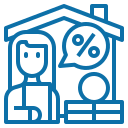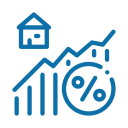Increasing Wealth & Decreasing Taxes
Homeowners and investors generally find real estate quite appealing due to how it creates wealth and shelter options for the owners in so many ways. There’s an old saying which should be a core foundational belief for real estate as well which goes something like as follows: “Don’t work hard for your money, let money work hard for you.”
Do you know what also seemingly works hard to destroy an individual’s and family’s wealth? The answer is inflation if you don’t own real estate.
For example, a $400,000 home that has consistently increased in price by 10% per year like in regions near Seattle may take 7.2 years for that same home to double in value by dividing 72 by 10. After 7.2 years, the $400,000 home may be worth $800,000 if the appreciation continues at 10% per year.
At the same time, the Rule of 72 makes the mortgage debt payback more affordable over time as the purchasing power weakens. Effectively, a $350,000 loan that was funded 7.2 years ago now is halved or cut in half because it’s equivalent to paying off the mortgage debt with $175,000 (or 50% of $350,000).
Leveraging Properties and Compounding Wealth
The ability to leverage residential and commercial property purchases by using primarily third-party bank money to acquire the property is one of the best aspects. A high percentage of owner-occupied home buyers across the state and nation come in with anywhere between 0% to 5% cash down to purchase their home. Their funding bank or mortgage company will bring in the balance of funds to close the home purchase with a loan-to-value (LTV) range between 95% and 100% for certain types of VA, FHA, or conforming loans.
Now, inflation isn’t just benefiting the property buyer’s down payment each year. No, the entire purchase price is growing and compounding in value each year. It’s quite common for the annual property value gains to exceed the down payment every single year.
For example, let’s take a closer look at a $480,000 home purchase for a first-time home buyer who qualifies for the FHA mortgage loan which requires just a 3.5% down payment. To simplify in this fictional example, the seller and/or family members paid for most or all the closing costs as a credit or gift. This way, we will just focus on the 3.5% down payment amount which totals $17,500.
Now, let’s see how much this $480,000 appreciates in value if it’s at or above the published inflation rate in the very first year of ownership as follows:

It’s not uncommon for homes to appreciate on average 5% to 7% per year on a consistent basis. Some peak years in prime housing regions have experienced anywhere from 20% to 40% price gains in just one year.
It is almost like winning big at a casino where you’re “playing with the (casino) house’s money” because you got back your entire down payment in just one year and your profits are just compounding each year.
Mortgage Interest Deductions
It is more important what you save and keep each year than what you earn. Most people these days spend more than 100% of their gross annual income. This figure is wildly deceiving because “gross income” is before taxes are withheld or paid. After the tax payments are calculated, most Americans are spending much more than they earn.
What is so incredibly beneficial about buying real estate is that the values have consistently increased over time as well as you get additional tax benefits that can reduce the amount of income taxes you owe while also potentially saving larger amounts of cash at the same time.
Mortgage deductions are usually allowed up to a $750,000 mortgage loan amount for qualifying residences for properties purchased after December 16, 2017. Any property purchased before December 16, 2017 may be allowed to deduct the mortgage interest on the first $1,000,000 mortgage amount. A qualifying property or mortgage type may be a first or second home mortgage or home equity line of credit (HELOC).
Let’s review the 2023 tax rates for both individuals and married couples:
* These are for 2023 tax estimates provided by the IRS, not for 2022. Please check with your own tax professionals before making any decisions.
Creating Multiple Income Streams
Most residential mortgages funded each year are guaranteed, insured, or purchased in the secondary markets by government entities such as VA, FHA, Fannie Mae, and Freddie Mac either directly or indirectly. With government protection, the mortgage rates for these loan products are usually much lower for borrowers. This is partly due to the federal government’s involvement with these loans reduces the funding lender’s future default and subsequent foreclosure risks.
With today’s mortgage rates still below 50-year historical averages, it is much easier to accelerate principal paydowns by paying biweekly payments and/or adding some extra principal to each month’s payment from excess monthly cash flow and shortening the 30-year mortgage term to just 10 to 17 years. If so, a free-and-clear property later effectively becomes your monthly “pension” which allows you to retire much sooner than later.
Since 1934, the Federal Housing Administration (FHA) has insured more than 40 million mortgages across the nation. Depending upon the borrower’s credit score, debt-to-income (DTI) ratios, and other underwriting factors, the required down payment may vary between 3.5% up to 10% down payments for borrowers with very low FICO credit scores that may be as low as 500. For most FHA borrower applicants with at least a 580 FICO credit score, they might qualify with just 3.5% down payments.
The FHA loan limits in 2023 for Washington state range from $472,030 in low-cost counties such as Spokane up to a high of $977,500 for high-cost county regions like those found in King County. These loan amounts are for one-unit properties that include single-family homes, condominiums, and townhome units.
For owners and investors looking to really leverage their investments while generating multiple monthly income sources, FHA loans are exceptional for two-to-four-unit properties for so long as you occupy one of the units as your primary residence. Two-unit property limits for FHA vary from $604,400 in low-cost counties up to a high of $1,251,400. Three-unit property limits range from $730,525 up to $1,512,650. Four-unit property loan limits for FHA are in the much higher $907,900 amount for low-cost counties up to a whopping $1,879,850 loan limit for high-cost county regions like King County.
For two-to-four-unit properties, your rental income may be large enough to cover your mortgage payment while you live there for almost free. Whether you buy a one-to-four-unit residential property or a commercial property, we’re here to help you let your money work hard for you while hopefully also seeing your income tax bills decline as well.













